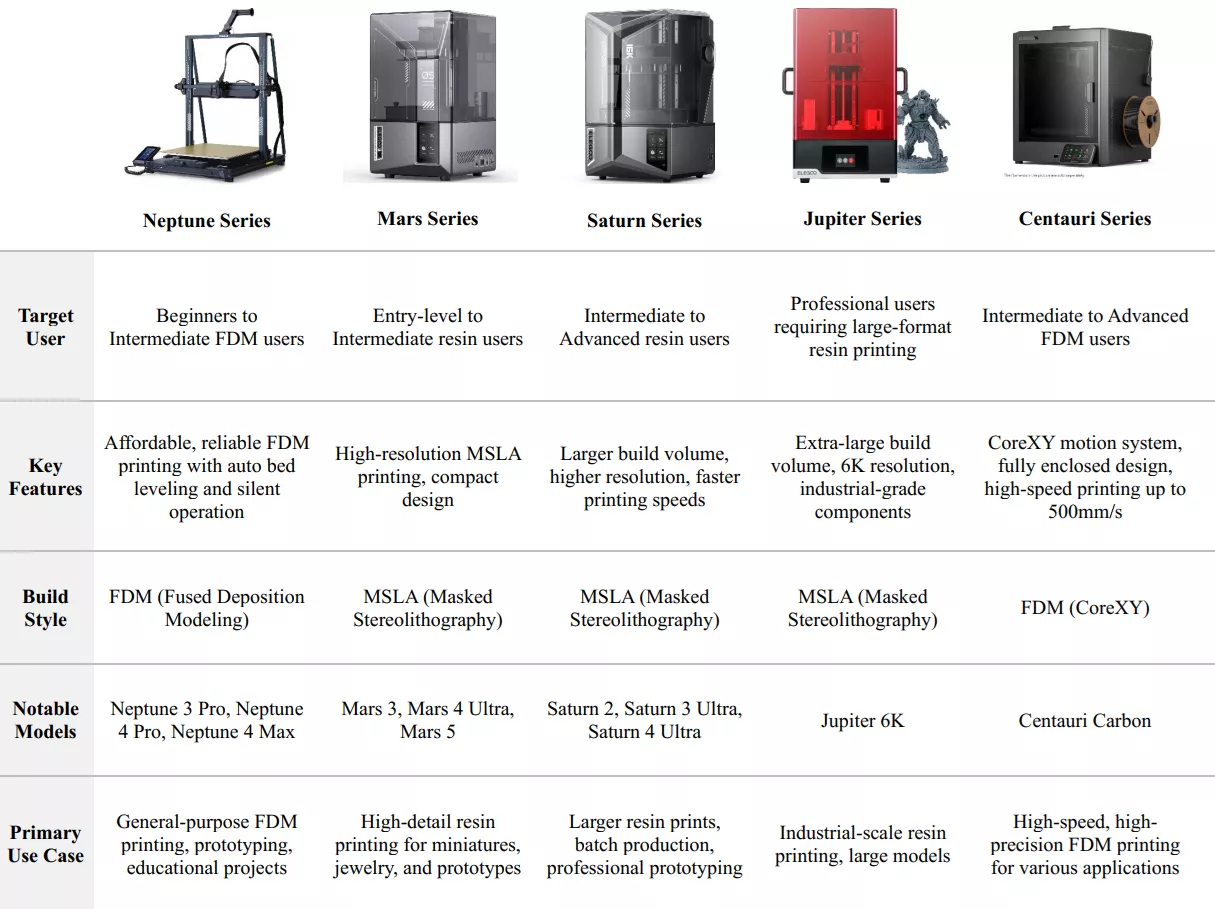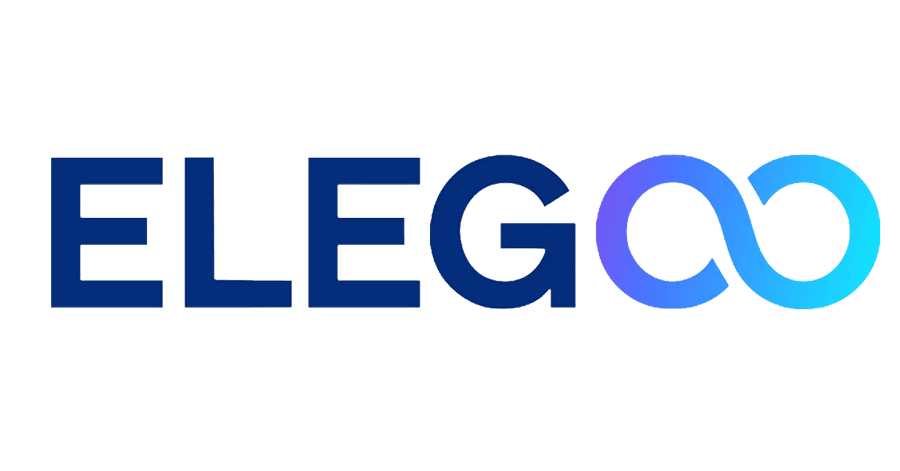Highlights
Exceptional print quality in both FDM and resin printers, especially at the price point
Extensive resin and filament compatibility across their product lines
Wide product variety from beginner-friendly Neptune series to high-end Saturn Ultra models
Aggressive pricing offering professional-level quality at accessible prices
Beginner-friendly setup with semi-assembled machines and detailed manuals
Rapid innovation cycle with regular releases of advanced features (16K resolution, auto-leveling, high-speed printing)
Good overall reliability but with occasional customer support inconsistencies
Large and active user community supporting troubleshooting, mods, and upgrades

Founded in 2015, Elegoo has quickly risen to become a major player in both the resin and FDM 3D printing markets. Initially best known for their affordable, high-quality MSLA resin printers (MSLA stands for Masked Stereolithography – a type of resin printing that uses an LCD screen to cure liquid resin layer by layer), such as the Mars series, Elegoo later expanded into FDM printing (Fused Deposition Modeling – printing with melted plastic filament) with the Neptune series. These machines are aimed at both beginners and experienced users.
Elegoo’s strategy of delivering powerful hardware at low prices, combined with strong community support, has made it a favorite among hobbyists, miniature painters, prototypers, and semi-professional makers. New releases like the Saturn 4 Ultra 16K and Neptune 4 Max demonstrate the brand’s ability to stay highly competitive in a fast-moving market.
Product Selection
4.3 /5
Elegoo made its mark with resin printers like the Mars and Saturn series, then expanded into capable FDM machines with Neptune. Known for high detail, great pricing, and a strong user community, it’s a favorite among modelers and makers alike.

Ease of Use
4.3 /5
Elegoo designs its machines with accessibility in mind. Most printers are shipped partially pre-assembled, allowing users to get up and running within an hour. Key usability features include automatic bed leveling (where a sensor adjusts the nozzle to maintain a flat printing surface), touchscreen controls for simple operation, Wi-Fi printing (available on some models), and beginner-friendly slicer profiles (preset configurations in slicing software that help achieve reliable results). For software, resin printers use ChiTuBox (a slicer tailored for resin workflows), while FDM printers run on Elegoo Cura (a customized version of the widely used Cura slicer). Both ecosystems remain compatible with third-party slicers, offering users the flexibility to evolve their workflow as their skills grow.
Cost & Affordability
4.8 /5
Elegoo is widely regarded as one of the best values in the 3D printing market. Entry-level resin printers like the Mars 3 typically retail between $200 and $300, while larger models in the Saturn range stay below the $700 mark despite their expansive build areas and advanced capabilities. FDM printers such as the Neptune 4 and Neptune 4 Max deliver high-end features like Klipper support and large-format printing at nearly half the price of similarly equipped machines from other brands. For users who want near-professional output without exceeding a hobbyist budget, Elegoo offers an outstanding balance of performance, technology, and affordability.
Print Quality & Speed
4.2 /5
Elegoo printers consistently deliver high-quality prints with minimal adjustment. The Mars, Saturn, and Jupiter resin series are especially known for extremely fine detail and smooth surface finish, easily matching results from more expensive printers. Newer resin models like the Saturn 4 Ultra boast up to 16K resolution (meaning the LCD screen used to cure resin has over 16,000 horizontal pixels, enabling extremely sharp prints). In the FDM category, printers like the Neptune 4 and Neptune 4 Max deliver smooth and reliable results with high speeds up to 500 mm/s, especially when using Klipper firmware (a high-performance control system that enables faster, more accurate motion). At top speeds, there can be slight trade-offs in surface quality, but overall, Elegoo achieves a solid balance of speed, reliability, and visual quality.

Material Compatibility
4.1 /5
Elegoo resin printers support a wide variety of UV-sensitive resins, including standard resins (rigid and general-purpose), water-washable resins (which can be cleaned with water instead of isopropyl alcohol), ABS-like resins (which offer greater toughness and impact resistance), and flexible resins (which mimic the feel and elasticity of rubber). These printers do not include any kind of material locking system, so users are free to use third-party resins without restriction. On the FDM side, the Neptune series reliably prints with PLA (a biodegradable and easy-to-use plastic), PETG (more durable and temperature-resistant), and TPU (a flexible, rubber-like material) right out of the box. With simple upgrades—such as installing an all-metal hotend (a component that melts the filament and tolerates higher temperatures) or adding an enclosure (a protective case that maintains a consistent internal temperature)—users can expand compatibility to include materials like ABS, ASA, and Nylon. Overall, Elegoo’s material versatility is impressive, particularly for budget-friendly machines.
Build Volume & Variety
4.4 /5
Elegoo offers a broad selection of printer sizes tailored to a variety of project needs. The Mars series is ideal for small, ultra-detailed prints such as miniatures or jewelry. The Saturn and Jupiter models are designed for larger resin projects, offering more space for prototyping or artistic work. In the FDM category, the Neptune lineup ranges from compact models to large-format machines like the Neptune 4 Max, which features a build volume of 420 x 420 x 480 mm—ample space for cosplay props, mechanical parts, or batch prints. This variety ensures that Elegoo provides viable options whether users have tight desktop constraints or need to produce physically large objects.

Reliability & Durability
4.0 /5
Elegoo printers are generally reliable and well-constructed, particularly when considering their price range. Resin models like the Mars and Saturn series have a solid reputation for mechanical longevity and consistent performance over time. FDM units, especially the Neptune 4 series, are similarly robust, though some users have reported occasional issues such as touchscreen glitches or increased fan noise after prolonged use. While customer support quality can vary by region, warranty services and spare parts are usually easy to access and reasonably priced. These factors combine to make Elegoo printers dependable tools for both casual and extended use.
Maintenance
4.1 /5
Elegoo printers require routine but straightforward maintenance. Resin printer owners should expect regular cleaning of the resin vat, occasional replacement of the FEP sheet (a thin transparent film that sits at the bottom of the resin tank), and the use of fine mesh filters to prevent contamination. For FDM printers, users need to monitor belt tension, clean or replace the nozzle when needed, and maintain a clean bed surface for reliable adhesion. Spare parts are easy to find through official and third-party suppliers, and the large online user base offers an abundance of tutorials, community mods, and printable upgrades that make troubleshooting and upkeep more approachable for all skill levels.
Technology & Features
4.3 /5
Elegoo is recognized for offering advanced technology at impressively low price points. Many of its printers now support Klipper firmware (an open-source control system known for enabling faster and smoother FDM printing), while its resin machines feature monochrome LCD screens (which cure resin faster and have longer lifespans). Additional features across the product line include ultra-high-resolution displays (up to 16K in some resin models), auto-bed leveling, dual Z-axis systems (for improved print stability), resin overflow protection systems, and linear rail motion systems (which offer smoother, more precise movement). While the software interface may not always feel as refined as that of premium competitors, the sheer quantity and quality of included features remain unmatched in the budget segment.
Conclusion
Elegoo’s commitment to making high-quality 3D printing accessible has helped secure its place as a top-tier brand in both FDM and resin printing. With a focus on affordability, technological innovation, and broad user appeal, Elegoo machines serve newcomers and professionals alike.
While customer service still has room to grow, the combination of print quality, features, and low cost makes Elegoo a go-to option for anyone looking to get serious about 3D printing without overspending.


